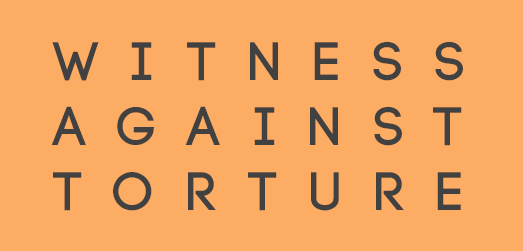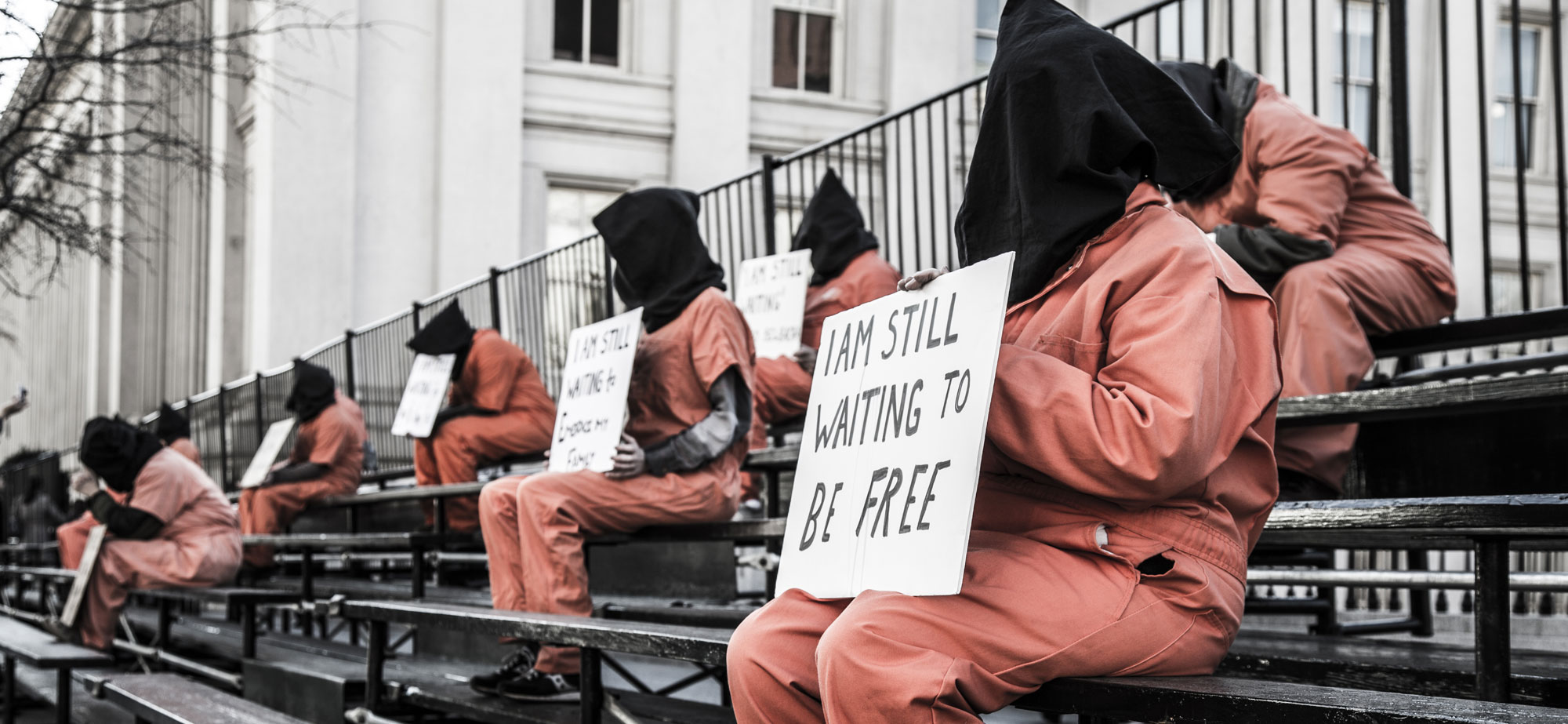From the Archive
Fast for Justice 2013: Day 1
Dear Friends,
January 11, 2013 marks the eleventh anniversary of the U.S. detention center at Guantanamo Bay, the seventh anniversary of Witness Against Torture’s January 11 presence in D.C., and our fifth liquids fast. Here we are again, pilgrims from across the country, gathering in D.C. Though it is not to pay homage to the nation’s capital that we come, but to honor a common cause, a divine mandate in fact, “love one another.” Even enemies, even strangers, undoubtedly those unjustly detained.
First Trinity has once again graciously allowed us their space and at a modest rate, though we are still looking to raise funds to cover the cost of rent, as well as liquid sustenance of juice and tea. The fast began this afternoon after a farewell-to-eating feast of pizza. Though it is a somber cause for which we gather, the atmosphere was paradoxically celebratory as many friends who haven’t seen each other for months, or even since last year, are reunited. As this struggle continues, we find joy in community. And it is a community that is continually growing. “We are a large circle,” Matt D. said at our first meeting of fasters, “but our circle is larger than faces you see.” We know many of you across the country (and farther) are joining us, and very much feel your presence here.
These updates are a way of welcoming those of you who are with us, though not among us, into the circle. We will include reflections from fasters present and apart, reports on actions and events, and links to relevant articles. In addition to these updates we intend to connect with those who are interested via “fasters phone calls,” stay tuned for the call-in number!
In Peace,
Witness Against Torture
In This Update
1) DAY 1 – Opening Circle Reflections (Compiled by Amy Nee)
2) Maryhouse Catholic Worker Friday Night Meeting recap. (by Ted Walker)
3) “Hunger Strike Poem” by Adnan Latif
Plus
1) “Guantanamo Bay Naval Base” An overview by Hiromi Yasui for The New York Times. 2) “Obama Disputes Limits on Detainee Transfers Imposed in Defense Bill” by Charlie Savage for The New York Times.
3) “‘America’ Reports from Guantanamo” by Luke Hansen.
Opening Circle Reflections, compiled by Amy Nee
John B. and Chantal D. facilitated our first reflection tonight. We were all invited to five minutes of silence, creating a space for thoughts and feelings that tend to tumble unheeded through our minds. “Consider what it is that you want to leave behind, and what it is that you bring.” The following are some of the words and thoughts that were the fruit of this seed planted:
detachment
day in court
personal is political
celebrating progress
faraway friends with us
care and support of community
we are all chained together
connected
discouraged
what can we do?
ache for ongoing nightmare
discovery of divine in ordinary
vulnerability – key to courage, love and intimacy
steadfast
desperation/disbelief/faith(in the miraculous)
worries – bills, grades, feelings – replace with presence
resignation
turbulent, uncentered
stress – holidays, busyness – empty self
entering a new sun, a new era
fully present
Friday Night Meeting Recap, by Ted Walker
This past Friday evening, many folks gathered at Maryhouse Catholic Worker for the weekly clarification of thought, as Peter Maurin called it. We titled the meeting “Guantánamo—Year Twelve Begins.” Unfortunately, we did not learn much good news of the previous year. Only three men were transferred from the detention center: two men to El Salvador, and one to Canada. About 166 men remain, still over half of which have been cleared for transfer for many years now.
No, we learned of far more tragic and grievous news. I spoke about Adnan Latif, who was found dead in his detention cell in the first week of November. At the age of thirty-six years old, Adnan had spent ten years, seven months, and twenty-five days detained at Guantánamo. He died there despite having been cleared for release several times since 2008. Then both Molly Kafka and Luke Hansen spoke of their experience of witnessing the pre-trial of Khalid Sheikh Mohammed and four other co-defendants at their military commission trial. A second year law student, Molly viewed the procedure from the only public live-feed screening in the United States, at Fort Meade, Maryland, and spoke of the legal aberrations that the commissions employ. Luke, a Jesuit novice and reporter for the Catholic weekly journal, America, was sent to cover the trial at the Guantánamo detention center in Cuba, and described for us the surreal scene there. And finally, Carmen Trotta spoke of the National Defense Authorization Act (NDAA) 2012, signed by President Obama just a few days ago, which makes the closing of the Guantánamo detention center that much more difficult.
When Luke spoke about the court scene at Guantánamo, he described his experience of being in the same room with people directly affected by the tragedy of September 11th, 2001. There gathered were the defendants, family members (chosen by lottery) of victims of 9/11, attorneys on both sides of the case and the observers. He said that it “created a complexity that I had not appreciated before.” It is this complexity that we bring with us to DC to study, explore, try to understand, share, take to the streets and articulate boldly before and within the various institutions of our nation’s capitol.
Since last year I have been thinking of Albert Camus’ terse appeal “Neither Victims nor Executioners” written in 1946. I believe we face a similar problem as he did then in France after the resistance. He writes, “We have seen men lie, degrade, kill, deport, torture—and each time it was not possible to persuade them not to do these things because they were sure of themselves and because one cannot appeal to an abstraction, i.e., the representative of an ideology.” In short, Albert Camus’ struggle reveals our own that the belief that Guantánamo, Bagram, and other instruments of “War on Terror” are no more utopian in their goal than our own in insisting in body and soul that murder and torture must not be legitimate.
Our work of resistance is manifold. Let us draw upon the lessons of the past and create our own paths to create a new society within the corruption of the old. Let us continue to build community. We who are privileged to be able to do this together while staying at Trinity Luthern Church for the next seven days will try to record our struggles and discoveries for you who are at home in solidarity.
Hunger Strike Poem
They are criminals, increasing their crimes.
They are criminals, claiming to be peace-loving.
They are criminals, torturing the hunger strikers.
They are artists of torture,
They are artists of pain and fatigue,
They are artists of insults and humiliation.
They are faithless—traitors and cowards—
They have surpassed devils with their criminal acts.
They do not respect the law,
They do not respect men,
They do not spare the elderly,
They do not spare the baby-toothed child.
They leave us in prison for years, uncharged,
Because we are Muslims.
Where is the world to save us from torture?
Where is the world to save us from the fire and sadness?
Where is the world to save the hunger strikers?
But we are content, on the side of justice and right,
Worshipping the Almighty.
And our motto on this island is, salaam.
*please let us know if you would like to receive these updates each day thru January 11th by writing to daloisio@riseup.net with “fast update” in the subject line*



Join us on social media